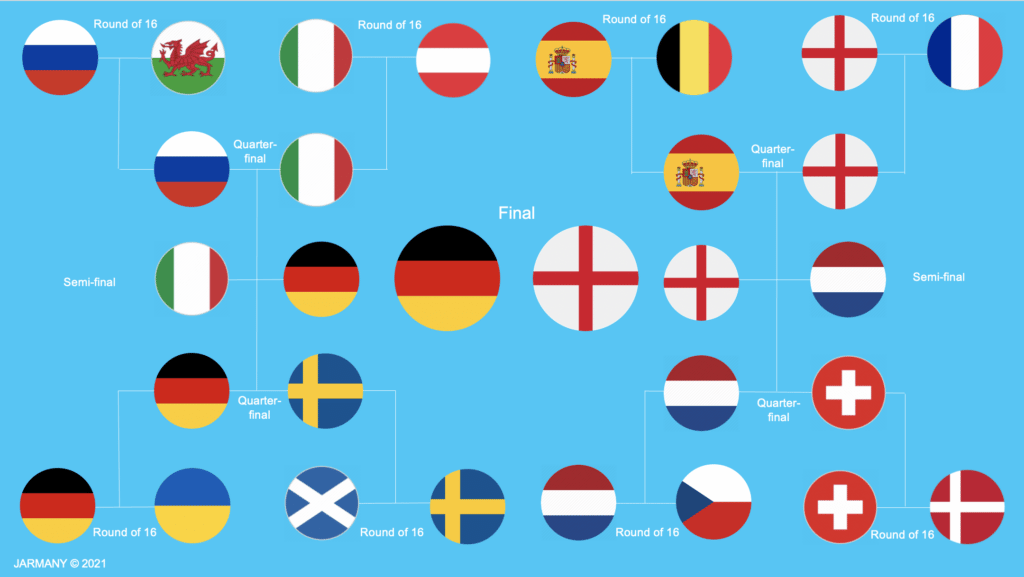Kicking off on Friday 11th June, the 2020 UEFA European Championships pose a brilliant opportunity for Gareth Southgate’s Three Lions to bring the country together after what has been a difficult 15 months for everybody. Having fallen just short in the 2018 World Cup, narrowly losing to a strong Croatia side in the semi-final, England will be optimistic of acquiring some silverware this time around. With hope in our hearts, our data scientists have built a model to predict the outcome of the tournament.
But will it culminate in Harry Kane lifting that trophy on July 11th? Let’s find out…
How does the model work?
Background
This model was developed by one of our Senior Analysts, Kiran Shridhar. The Euros Predictor works by firstly feeding three key historical datasets into a python script to create a machine learning algorithm. This machine learning algorithm is known as logistic regression and embodies three important concepts which tie into the aforementioned footballing datasets:
- Firstly, we have used all-time international football results, dating back to 1870 to the current day, which are incorporated into the model as the data integration element. This is a key factor contributing to the machine learning algorithm.
- Secondly, feature modelling involves the FIFA international rankings by making the overall prediction of highest relevance to the current tournament and its form sides.
- And lastly, outcome prediction uses the championship fixture list to set the baseline for the group stage results, which then move through to the knockout stages.
Analysis
In recent years machine learning has become a more prevalent concept which allows programs and artificial intelligence to predict outcomes as they receive more data. But how can this be applied to football?
Historical results data is fed into the algorithm one game at a time. The model then learns how each piece of data you feed it influences the outcome of the game positively, negatively and to what extent. The more results we are able to feed it, the more accurate the predictions should be. Given that we’re able to pull data from 1870, we hope we’ll be pretty close!
So, the all-important question
The first thought on everyone’s minds (and the reason you probably clicked on our blog today) is, “Where do England finish this summer?”
Who knows, you may have some other national influence or an important company sweepstake – whatever the reason, we’ve got the stories of all 24 countries covered. If you’re someone who doesn’t like the ending spoilt: look away now. We’re confident we’ve got this one right.
The predictions
As you may know, England’s tournament starts with three group matches against Croatia, Scotland and Czech Republic on the 13th, 18th, and 22nd June respectively. What is seemingly a challenging group (including 2018 world cup finalists and a home nations rivalry), is navigated effectively by Southgate’s men, finishing on top of the group, and advancing to the round of 16.
There we meet with France who have been drawn in what is being billed as the tournament’s Group Of Death, including 4-time world cup winners Germany, and a Portuguese side led by Cristiano Ronaldo. The reigning World Cup champions France manage to scrape through to 2nd in Group F, setting up the tie vs England. However, the England fixture is one hurdle too many for the French, and the Three Lions march on to the last 8.
The quarter finals pose another challenging tie for England, playing 3-time European Champions, Spain. Which, via our predictions, will be the one-to-watch fixture of this stage of the tournament. Having topped group E and dealt with their quarter final exchange with the Czech Republic, the Spanish looked to be poised to make it 4 European Championships, which would place them as the most successful country in the history of the competition. However, Tika-taka looks no match for route one football as England’s run continues to the semi-finals.
Moving into the final 4, England land the Netherlands as opponents. A repeat of the Nations League semi-final where the Oranje came out on top with a 3-1 victory. The summers dream continues for England as they’re able to keep their brilliant form and advance to the final.
I know what you’re thinking; “pinch me, I must be dreaming”. Well keep smiling because you’re not. We predict that England will be playing in the European Championship final on Sunday July 11th. Use this information wisely, and book your local pub to watch the game, because no doubt there won’t be an empty seat in the country. The gold medal match will be unsurprisingly against non-other than Germany.
Kane vs Neuer, Mount vs Kroos, Maguire vs Werner – The stage is set!
But it will be England fans hearts’ which are broken as Die Mannschaft make it European Championship number 4 – most likely on penalties!
I don’t know about you, but it could make for quite some summer. Let’s hope our model falls just short and England can go one better!
Ipsos Jarmany’s predictions for the tournament

ABOUT IPSOS JARMANY
Ipsos Jarmany is a team of expert data analysts and data scientists based in London, UK. Contact us to discuss how we can help you get more from your data.


